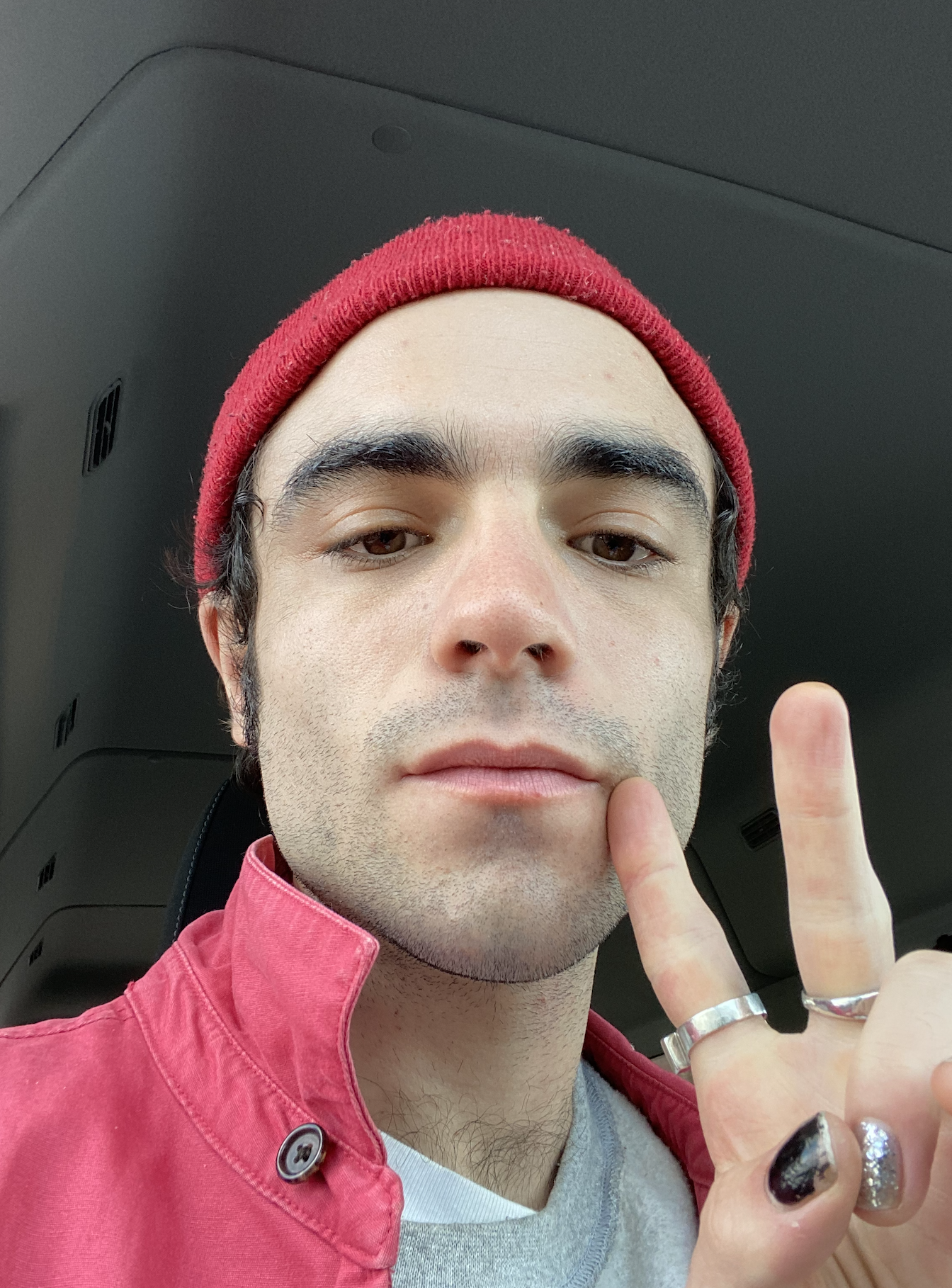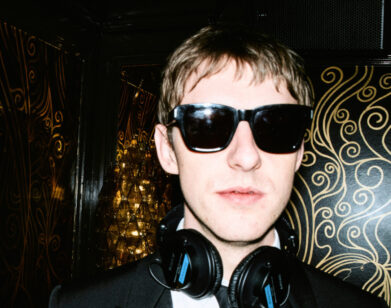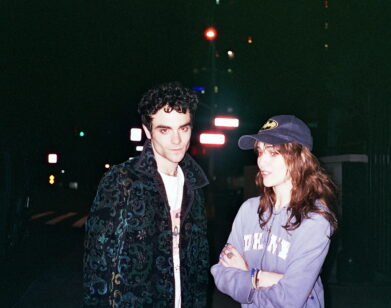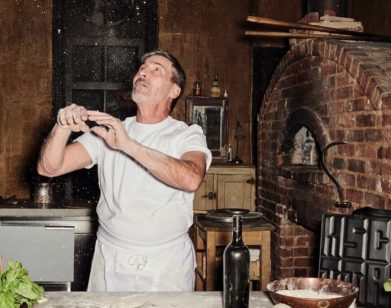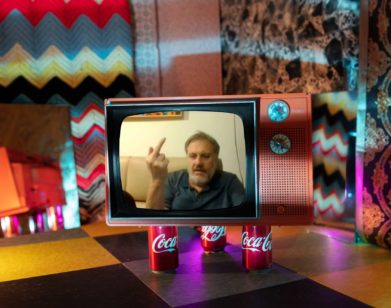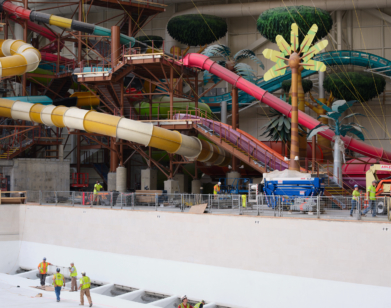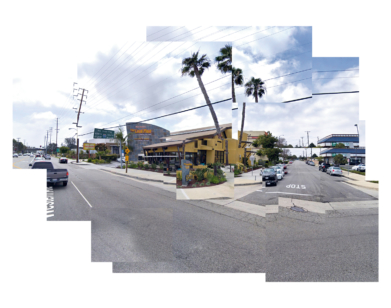Music!
Del Water Gap Could Have Been “The Baloney Pony”
There’s a nice ring to Del Water Gap, the stage name of the singer-songwriter S. Holden Jaffe. Though the name bears little personal significance—the singer first saw the phrase on the back of a truck, and added it to a long list of potential future band names, including “The Baloney Pony”—it reflects the spirit of his music: gentle, tender, and introspective. The Brooklyn-based artist first gained a following at the peak of the pandemic, when he released “Ode to a Conversation Stuck in Your Throat,” a head bobbing punk anthem for the lovesick and the housebound. Now, a year later, Jaffe has released his eponymous debut album, Del Water Gap—a glimmering 12-song epic—to be accompanied by a newly-announced 2022 tour that kicks off this January at Webster Hall. To mark the occasion, Jaffe sat down with Interview to discuss the dark energy of Times Square, his upcoming tour, and his love for Tamagotchi pets.
———
JACKSON WALD: What’s up!
DEL WATER GAP: Nice to meet you.
WALD: So, walk me through the process of making this album.
DEL WATER GAP: I didn’t necessarily sit down and try to write a record. This record has been the product of my life over the last five years. I finished school and was working a few jobs: setting up photo booths at influencer parties, waiting tables, helping old ladies edit their pictures on Photoshop. I would work from 6 a.m. to 6 p.m., and then at 7 p.m. I would go to the studio in Times Square and stay up all night trying to make songs. The first song that came together was “Hurting Kind.” I ran into an ex of mine at a party and we ended up going home together and talking all night. In the morning, I was taking the subway home, and that song just came out. I sent it to her later that day.
WALD: Do you have a process when you write? Is there a certain environment that gets the creative juices flowing?
DEL WATER GAP: I’m a very introverted person. I love spending time alone. But this year, being forced to spend so much time alone made me realize how important it is to have the mirror of other people to help us understand ourselves and our experiences. I journal every day, and I’ve done so for a few years. My best songs come out of sitting with an instrument and trying to conjure. All we can do as creators is flex the muscle, work the muscle, and stay in shape. Then, when songs want to show up, we’re ready.
WALD: There are obvious themes of anxiety, hiding away, and shyness on the album. Is it cathartic to translate those feelings into something public?
DEL WATER GAP: Definitely. When we’re struggling—whether with anxiety, loneliness, or addiction—often we get this horrible solipsistic feeling, like, “No one else could possibly feel this bad.” A lot of my recent work has come from that feeling, and it has been very cathartic to see it resonate with a lot of other people. It’s absolutely cathartic; it’s therapy that results from therapy. I’ll see my therapist, then I’ll go home and write a song.
WALD: Was there a moment where you were like, “This is finally ready for the world to hear?”
DEL WATER GAP: There was a song that I wrote when I first moved to L.A. called “It’s Not Fair!” which is on the album. It’s a song about my last relationship in New York City, and I was struggling with some addiction problems and staying up all night. I would buy these big poster boards at Staples, sit on the floor of my partner’s bedroom while she was sleeping, and try to organize my thoughts by making these massive flow charts. It was a really terrifying time. I’m doing much better now, but I really freaked a lot of people out back then. As soon as the song was finished, I realized that it’s the song that contextualizes every other song. All of a sudden, I was like, “this is a cohesive body of work that represents me.” It’s my favorite one to play. It feels like old Del Water Gap meets new Del Water Gap.
WALD: I watched some of the music videos for the album, and I was blown away by “Perfume”—specifically the color scheme and direction. I was wondering if you could walk me through how that video came into existence?
DEL WATER GAP: The videos came about because one of my best friends in the world is this kid Charlie Plumber, who is a brilliant actor and a true lover of film. He turned me on to Gus Van Sant, [Richard] Linklater, and River Phoenix. He showed me Breathless and Days of Heaven for the first time. A couple of years ago, I went on a trip with him to Montana. We watched a bunch of films and we listened to the early version of my LP. When I signed my record deal in January, we decided to go back to Montana. Paris, Texas became a big reference for those music videos. It was the first time in my career I really felt that electricity that comes from being in a group of people, all in one place, for the sole objective of making great art.
WALD: Who did you listen to while you were making the album?
DEL WATER GAP: A lot of the record came about as I was reconnecting with my most elemental listening, the music that got me into music when I was a teen. The Cure, The Doves, and Oasis have all been huge for me over the last couple of years. I’m also into straightforward songwriter music, like Bob Dylan, Randy Newman, Harry Nielsen, and Joni Mitchell. Tight songwriting has always really appealed to me, so that’s something that I’ve made sure to focus on.
WALD: I’m named after Jackson Browne, so I’ve got singer-songwriter in my DNA. If you could have any artist in music history turn on your album and listen to it, who would you choose?
DEL WATER GAP: Honestly, my grandpa. He died when I was 14, but he was the fucking boss. He was a composer and an executive at Columbia Records. He signed Leonard Bernstein, was friends with Igor Stravinsky, and he was the first person that exposed me to the music industry. I’ve thought about him the most as my career is changing and I’m experiencing certain things I never thought I would experience. I just wish that he could be around for it.
WALD: How did you come up with Del Water Gap?
DEL WATER GAP: I was the drummer in a noise rock band when I was 16 or 17. They wouldn’t really let me sing in the band so, in the back of my head, I was like “I should start my own project, so I get to sing.” We were driving around one day, and on the back of a white box truck, I saw “del water gap” written in sharpie. And I was like “That’s cool. I don’t know what that is, but I’m gonna write it down.” I had a long list of names on my phone, as everyone does. I later found out that it’s a national park in Pennsylvania.
WALD: Do you remember any of the other potential band names?
DEL WATER GAP: I just found the note the other day and screenshotted it. There were some really horrific ones. “The Baloney Pony,” “Pepper’s Ghost,” and “Kids Who Play in Igloos.” And then the last one is “Del Water Gap.” This is a note from July 14, 2011.
WALD: This could have been the Interview Magazine Baloney Pony story.
DEL WATER GAP: [Laughs] That’s right. Baloney Pony worldwide takeover.
WALD: Where is the best slice of pizza in New York City?
DEL WATER GAP: My personal favorite is Artichoke on 14th street, which might make me sound like a tourist but honestly, that artichoke slice is like a bowl of soup in a slice. That might not sound appealing to most people, but when I miss New York pizza, I miss Artichoke. A close runner-up is Paulie Gee’s in Greenpoint.
WALD: Is there anywhere worse than Times Square?
DEL WATER GAP: No. Times Square is the worst place, and I think that a lot of the dark energy that is in my record comes from having to record in Times Square. I did not record in Times Square by choice, I did it very begrudgingly. I would fight through armies of big bus-ticket salesman, mixtape hustlers, and people in fucking Mickey Mouse costumes to get to the studio. It’s the armpit of New York City.
WALD: If you could go back and teach a course at NYU, what would it be?
DEL WATER GAP: That’s a great question. I would like to teach a course on the history of ’90s toys. I really got into Bop-it over the last couple years. You know what Bop-it is?
WALD: Yeah, of course. Pop it, lock it.
DEL WATER GAP: Twist it. When I got into Bop-it, I started researching and remembering a lot of the toys that I grew up with, like Tamagotchi pets—there’s something so morbid about giving a child a digital pet that is bound to die. There are so many great toys that came out of that era, so I would like to teach a class about the culture and toys of that time, and maybe tied to television and music.
WALD: What was it like playing the Bowery Ballroom?
DEL WATER GAP: It was one of the most important moments of my life. I moved to New York when I was 18, and the first thing I did was go and see a show at Bowery Ballroom with my best friends. I remember walking in and being like, “This is it.” I never thought my grandmother would see me play a show. I didn’t think she would survive Covid. And there she was on the balcony. There are times in this career when you really check in, and you wake up again. The line moves, you sell out a couple of shows, you get some good playlisting, and that feels really special. But there are certain moments when you come back to the present and say “Oh, my god, I’m fucking doing it.” That night was one of those moments where I felt hyper-present and grateful and so moved by the support that has grown around my music and around me. I’ll never forget it—it was an awesome, beautiful night.

